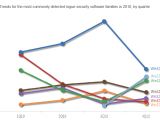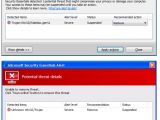Not only is the real Microsoft Security Essentials quite successful with well over 30 million downloads by the end of 2010, but fake Microsoft Security Essentials is also enjoying its fair share of success, albeit at the expense of unsuspecting users.
The rogue security solution was the second most prevalent piece of scareware at the end of 2010 according to data shared with the public by the Redmond company through Security Intelligence Report volume 10.
Fake antivirus products were identified and blocked on no less than 19 million computers in 2010 by legitimate security solutions from Microsoft, including MSE.
Win32/FakePAV (fake MSE) might have been just runner up to Win32/FakeSpypro at the end of the past year, but it was certainly a valid challenger for the number one spot.
“Win32/FakeSpypro was the most commonly detected rogue security software family in each quarter of 2010, with more than twice as many detections and removals overall as the next most prevalent family. Names under which FakeSpypro is distributed include AntispywareSoft, Spyware Protect 2009, and Antivirus System PRO. Detections for FakeSpypro were added to MSRT in July 2009,” Microsoft added.
However, as the chart included with this article shows, the volume of FakeSpypro infections has been declining, while FakePAV is growing strong.
“Win32/FakePAV was first detected in 3Q10 and rose quickly to become the second most commonly detected rogue security software family in the fourth quarter. FakePAV is one of several rogue security software families that masquerade as Microsoft Security Essentials,” the software giant said.
“It presents a dialog box that is similar in appearance to a Security Essentials alert, listing one or more nonexistent infections that it claims it cannot remove. It then offers to “install” a trial version of a different security program (actually another part of FakePAV itself), after which it proceeds in a manner similar to other rogue security software programs.”
Fake Microsoft Security Essentials is essentially Rogue AV or scareware, created to masquerade as the legitimate MSE and blackmail users into paying for licenses by threatening them with inexistent malware alerts.
In addition to claiming its MSE, this Rogue AV is also distributed under the following names: Red Cross Antivirus, Peak Protection 2010, AntiSpy Safeguard, Major Defense Kit, Pest Detector, ThinkPoint, Privacy Guard 2010, Palladium Pro, etc.
Customers need to be aware that Microsoft did not charge them for Microsoft Security Essentials 1.0 and that Microsoft Security Essentials 2.0 (MSE 2.0) is not only free, it’s free for end users and small business customers alike (for up to 10 PCs).
Microsoft Security Essentials (MSE) 2.0 RTM is available for download here.

 14 DAY TRIAL //
14 DAY TRIAL // 

